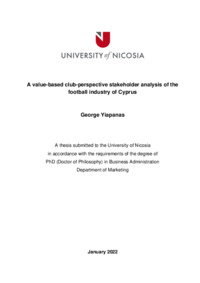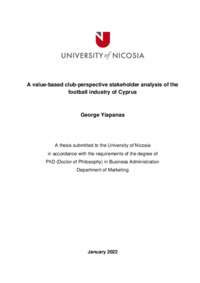-
Football has long transcended its state of being a sport, to evolve into a business that supports a complex and dynamic multi-billion industry. Never having lost its identity, it still bears massive influence, far beyond the economic one, affecting and being affected by a multitude of stakeholders. Inexorably, this phenomenon of multi-stakeholder envelopment, entails a wide set of challenges, risks and considerations for football clubs that need to develop the requisite strategies that identify, interrelate and, ultimately, balance the value exchanges involved, towards a sustainable future. The above highlight the imperative of understanding the nature and role of key stakeholders and delineate their delivered value towards a football club. Clubs share value and align interests and strategies with each stakeholder, forming alliances and partnerships that are founded on a win-win principle; and the collection and interconnection of these relationships constitute the backbone of a strategic framework, that enables clubs to respond and adapt efficiently and effectively to the incessant environmental changes. This is, however, not a set of individual linkages, but a systemic network of stakeholders and values, whose collective effect shapes the essence of the football ecosystem.
Despite its afore-described importance, existing theory remains in its infancy and new in terms of explicit knowledge and degree of interaction. Extant studies on the topic are only partial and incomplete; or tend to over-focus on individual stakeholder-value relationships; or perceive stakeholders as broad categories overlooking the fact that various sub-categories exist as diverse entities; or analyse the industry’s actors and values individually and not as a system. This research contributes to the field of sports strategic management and bridges the gap in knowledge through its aim, to comprehensively identify the football industry stakeholders and their relative value in the individual club perspective, and to conceptualise and test their interrelationship in the Cyprus context towards the development of a corresponding framework of club benefits. This study addressed the stakeholder theory on a wide range of individuals and groups, enhancing the theory itself, in a context that until now was lacking empirical validation, and developed for the first time a unified club-specific framework of benefits.
Methodologically, considering the complex contextual circumstances, the study developed and applied a customised multi-level approach to collect and verify qualitative data. The research deployed every significant relevant study in the field to develop an initial theoretical generic framework, which was first validated by an Experts Panel and subsequently tested in the Cyprusspecific context. The empirical stage applied the qualitative approach, gathering data through forty-one semi-structured, face-to-face interviews with individuals within the top nine football clubs, as well as with key industry stakeholders who de facto represent specific groups, in order to validate the findings.
The research findings contribute significantly to knowledge, presenting scholars and practitioners with a systemic and comprehensive understanding and prescription of the individual club stakeholder management relationships and synergies. In this vein, the development of the final framework acts as a map, a blueprint for both theory and practice, bridging the gap in the literature, offering new avenues for further research, and arming executives with practicable valid knowledge. The research’s content, context and methodology generate a holistic set of contributions to scholarly business knowledge, and the gained insights and recommendations act as catalysts to individual football clubs’ strategic redevelopment and repositioning against their internal and external stakeholders.
A value-based club-perspective stakeholder analysis of the football industry of Cyprus
- PhD thesis
- english
-
- Business Administration -- Marketing



